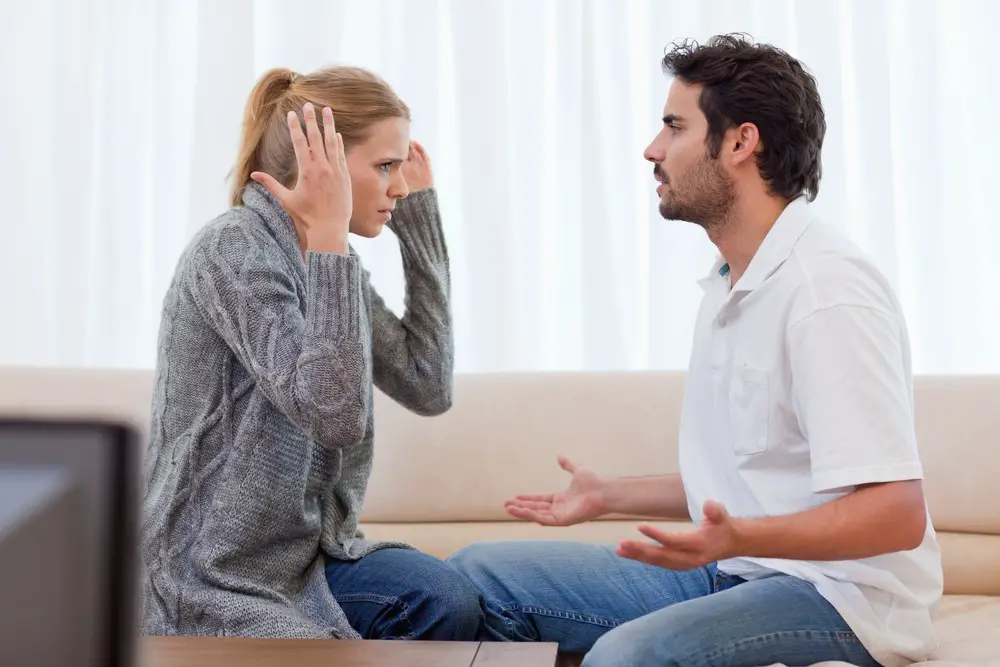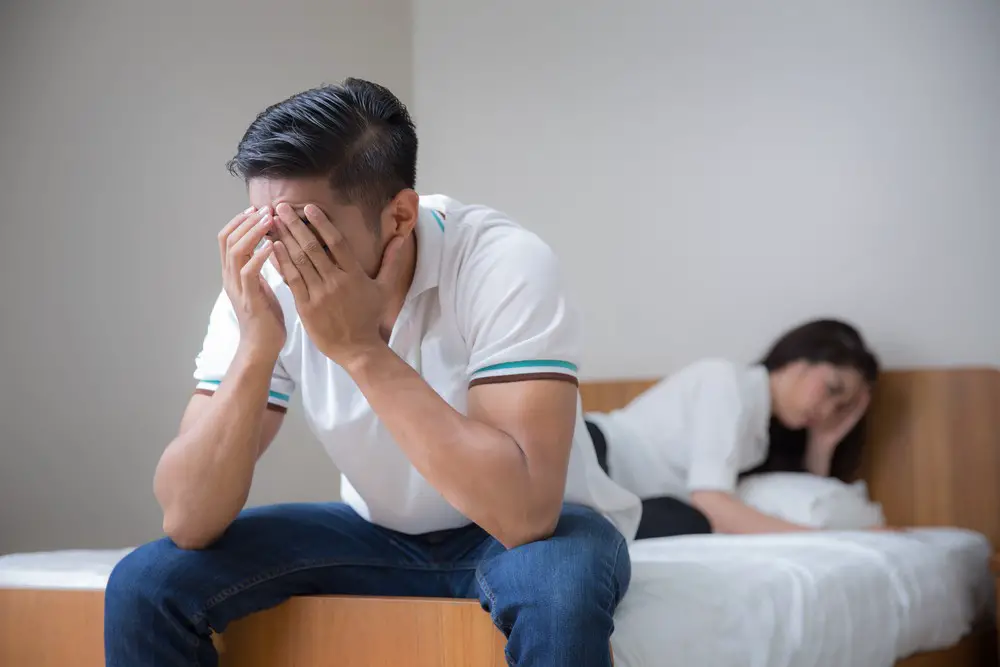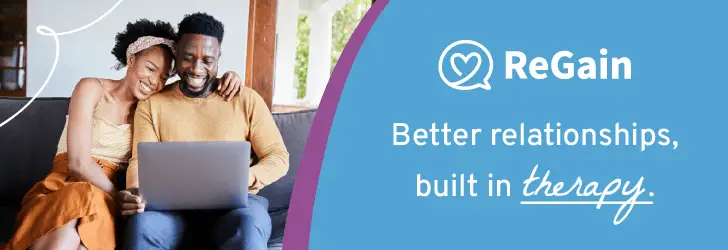As a BetterHelp affiliate, we receive compensation from BetterHelp if you purchase products or services through the links provided
We all want to feel loved. Feeling unloved within a relationship has several potential reasons. Sometimes the causes are more straightforward than you think, but sometimes they may indicate a deeper problem with your relationship or within yourself.
Why do I feel my husband hates me?
If you have a constant feeling that tells you, “My husband hates me,” it can lead to terrifying feelings that impact your self-esteem and leave you feeling isolated.
Several potential issues can leave you feeling like this, including a long-term relationship that’s lost the spark of new relationship energy. Often, as a relationship takes its course, issues like a clash of values or attachment and emotional problems in one or both partners can make you feel unloved.
Childhood experiences significantly influence how we learn to express affection and emotions. Therefore, you and your partner must explore how your past experiences relate to your feelings. Past traumas, stress, and insecurities can also contribute to your feeling that your husband hates you.
However, we read on Marriage.com about the consequences of feeling unloved in a relationship. Besides being a symptom of several mental health issues like depression, anxiety, and bipolar disorder, it’s also a symptom of jealousy or emotional disconnection. Moreover, feeling that your husband hates you can also cause depression. Furthermore, feeling unloved can create a pattern that alienates your partner.
Feeling unloved in your relationship may also have nothing to do with you. Your partner’s behavior may also greatly impact how you feel.
Whatever the case, you need to find the cause of your feeling unwanted before determining the best way to deal with it.
Common signs of feeling unwanted
These are some of the most common signs that you’re feeling unwanted in a relationship:
- You put much more energy into maintaining the relationship than your husband
- Your relationship feels mostly one-sided
- Your partner never initiates intimacy, romance, or sex
- There are significant changes in your sex life
- Your husband has pulled back in his interest or past efforts
- You have noticed a disinterest from your partner in spending time with you or physically touching you
- Your husband doesn’t listen when you speak of your concerns or share stories, and he does the same on social media
- You notice your husband is attracted to others or tells you of his attraction to them

What to do when feeling unloved?
Dealing with feeling unloved will depend on how severe the problem is and how long you have felt like this. First, you must look deeper at yourself to see if the feeling stems from within, and then delve deeper if you don’t find the answers there.
Follow these steps if you feel that the phrase “My husband hates me” represents your feelings right now:
1. Connect with yourself
Self-reflection may offer some insight into your feelings. It can also help you uncover the root cause of why you’re feeling unloved.
Several issues, including jealousy, attachment styles, belief systems, insecurity, or deeper emotional trauma, can make you feel unwanted. Meditation, journaling, or speaking to a loved one can often give you a better perception of whether your feelings stem from your or your partner’s actions.
2. Communicate your feelings to your partner
If you don’t feel that you have resolved the issue after self-reflection, it’s time to communicate your feelings to your partner.
It’s important to tell your partner honestly and openly what you feel and avoid blaming them. Communication is crucial because perhaps your partner prefers to keep stress to himself or doesn’t know how to tell you about their feelings without being asked.
Discuss the potential causes and how you can change things to resolve the way you feel. These could include providing regular reassurance, paying more attention to each other, scheduling time for intimacy, or making time to do things together.
It’s important to communicate your needs; otherwise, how can they be met?
Even if your partner indicates that his interest in you has decreased, but he doesn’t know why, you both need to discuss the issues and find ways to solve them while showing appreciation for each other.
3. Develop a robust self-care routine
It’s easier to demand love from others when you love yourself. You can do this by paying attention to every moment throughout the day where you may get a feeling of love. Learn to combine these moments, creating a greater sense of being loved.
Self-care, either physical or emotional, is an effective way to strengthen yourself and provide relief from feeling unwanted.
4. Avoid toxic behavior
If you still feel unwanted after trying self-reflection and communication, you must rule out that you aren’t a victim of toxic behavior. The best way to spot a toxic person is through therapy or a support group because it’s not always easy to spot it in others. If your partner cannot stop repeating these toxic patterns, you may need to move on.
5. Get help from a therapist
If you have tried all the above but still keep thinking, “My husband hates me,” find a professional like a therapist or relationship coach to speak with. You could go alone or together to a professional who can help you find the cause of your feeling unwanted. They will offer suggestions on how to resolve your feelings.

When should you end the relationship?
Certified sex and relationship therapist Dr. Tammy Nelson, Ph.D., quoted from Very Well Mind, “It’s vital to care for yourself and, if needed to separate from a relationship that is no longer working.”
Therefore, if, after exploring your relationship from every angle mentioned above, you have concluded that your partner doesn’t want you, you deserve to find another person who will meet your needs.
Final Take
It’s not uncommon to feel unloved in a relationship. Relationships are often affected by time. Daily distractions or mental issues can also take their toll. However, relationships require effort from both partners to ensure no one feels unloved. Make an effort to discover why you feel like that, and take measures to allow you to live life to the fullest.
FAQs
How do I stop feeling unloved?
The best way to stop feeling unloved is to focus on self-reflection and identify the root cause of your feelings. Once you have identified the issue, please communicate with your partner about it openly and honestly without blaming them. Additionally, develop a robust self-care routine while avoiding toxic behavior and, if needed, seek advice from a therapist.
What are the signs of feeling unwanted?
Some of the most common signs of feeling unwanted in a relationship include putting more energy into maintaining the relationship than your partner, noticing changes in your sex life or physical affection, and having difficulty communicating with your partner.
When is it time to end a relationship where I feel unwanted?
If you have explored every angle and concluded that your partner doesn’t want you, it may be time to end the relationship. Caring for yourself and finding someone who meets your needs is important.
What actions can I take to show my partner that I love them?
Showing your partner love can be done in many different ways. Some common ways include paying attention to them, communicating openly and honestly, showing appreciation for one another, scheduling time for intimacy, doing things together, and providing regular reassurance.
What should I do if my partner refuses to talk about our issues?
If your partner is not open to discussing your issues, consulting with a therapist or relationship coach might be a good idea. They can offer suggestions and help you better understand why they may be avoiding communication. Alternatively, attending support groups or couples therapy might be beneficial.
How do I know if my partner is emotionally unavailable?
Emotionally unavailable partners may show signs of being distant or aloof, making excuses to avoid meeting up, speaking on the phone, and not sharing their feelings. It is also worth considering if they have a history of unhealthy relationships or lack self-awareness. You can consult with a therapist to gain more insight into their behavior.
- 3 Ways Wearing a Hat Can Help Lower Your Stress Levels - April 19, 2025
- Breaking the Silence: Why Men’s Mental Health Matters More Than Ever - April 15, 2025
- How to Transform a Home’s Patio Space into a Relaxing Space - March 23, 2025
This site contains affiliate links to products. We will receive a commission for purchases made through these links.




